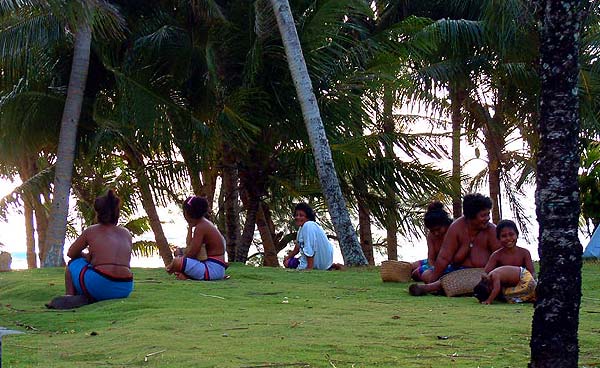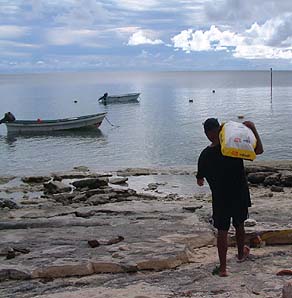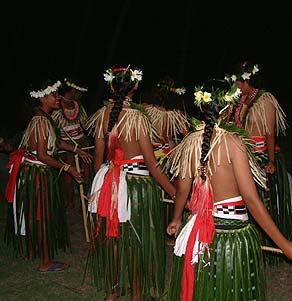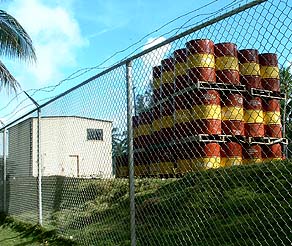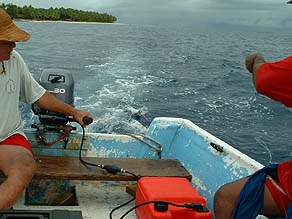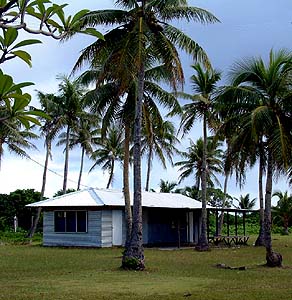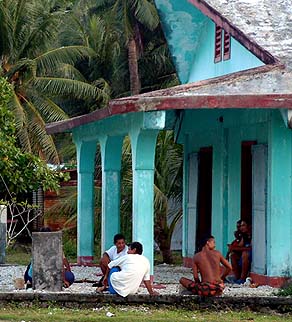 |
 |
 |
|||||
|
|
|
|
|
|
|
|
|
|
|
|||||||
|
|
|
“To an outsider looking in and seeing how things are," Cal says, "it would seem that things are still very compacted, uniform, unified with a very cohesive plan. But from a person within and seeing what it used to be and seeing what it is now, there has been a sort of loosening up that has taken place over the years. "However, I shouldn’t be too quick in my criticism of the situation because I think there’s still that community cohesion in existence, whether it’s within the family unit or clan unit or island unit or Ulithi as a community. There’s just a little bit of loosening up. But there is still an attempt to keep all those parts moving, even to this day."
|
||
|
|
||
“We used to have inter-island activities, responsibilities that are done from one island to island that are still happening these days. From clan to clan, family to family, that is still happening. But not with the serious intention it had before this. It is not serious as it was before.” “The people of Falalop and Asor—the big islands—they have food,” Ignathius says. “We don’t have much on Mogmog, and the people of Fedraey, they don’t have much food either. But we have fish, so when we get some fish, we give it to them and they bring us some food. That’s exchanging. Well, we still do it, but now we have boats, people can go wherever. We still do that sometimes, but not like before. “I will blame the money for that, because now we have the money, I will think of myself first. I’ll just delay helping others because not enough for me yet. But it’s hard to get money here, there’s no job or anything, so once you get money, you want to hold on to it, then worry about these other people later.”
|
|
|
“For dancing, we have to cooperate. We have this group of men and women, like an organization, they start talking and planning things, it might help if they bring up those things and see if we can still hold on to them, or maybe we cannot anymore. Because we need cooperation in all these things that we do together. Only one or two persons cannot do the dance, many people are needed. "So we need to cooperate, but I think that’s our problem now. We don’t seem to be cooperating any more. I’m blaming that on money, because before, when things were plenty, we seemed to cooperate and do things together. But now I work, I have money. We’re still trying. I think in the whole Ulithi Atoll, each island is still trying to cooperate, on their island. But the cooperation between all the islands is dying out, I’m afraid. “I feel that it’s important to hold on to traditional, culture things, but the changes are so rapid that people seem to lose interest in all those things. And if they are not interested in them, we cannot do them.”
|
|
|
|
“Now it seems that we are beginning to be separated in our work and other things,” Philip agrees. “For example, before when a man went fishing and caught a lot of fish, he would distribute these fish so that even those people who do not have men in their family could eat fish. And whenever people went fishing, the chief would make sure that fish was divided—even though it’s your fish because you caught the fish, the Chief would say, ‘put down your fish and we’ll divide, everybody must eat.’ And when there was work—community work—everybody participated.”
|
||
|
|
||
“But today, we have ice boxes and so we do not distribute our fish until the ice box is full. I think one reason also is gasoline. Before, we used canoes and it was not expensive. People helped you in making your canoe so when you caught fish, you were obliged to give them fish. But now that we have boats, each person buys his own boat without the help of the community, so we don’t feel any obligation to give them fish when we catch it. "And also gasoline is expensive. So, if we distribute our fish, then we will have to buy more gasoline and go fishing tomorrow. So, the changes that have come to us, come with the new materials that we have. It’s not that we don’t like it, but it’s that it has changed our customs so much. And, so now it’s hard for people to share their fish, because, before, if you don’t share your fish, it would spoil because you had no way of keeping it fresh. And also the chiefs would get mad."
|
|
|
“Before, if you went fishing and you came back with many fish,” Manuel agrees, “you gave some to other people, free. But today, no more. Because of the money. You work for money, you have money, you buy your own gasoline, your own boat and engine. But I never gave you one penny for gasoline so that’s why we start doing this. So these are the kinds of customs that we have lost today, because of the money. "For example, when I was teaching, like Mariano and some other children, I worked for nothing. But I didn’t have a problem because I had my canoe to go fishing. I had land for my food, and things like that. But today, you cannot do that. No pay, no food. “We were looking after each other before,” Philip concludes, “and now it’s really hard. Even if you have relatives, you have to fill up your ice box first.”
|
|
|
|
“All over the world, there’s a change in kids,” Juanito remarks. “Perhaps the kids are getting smarter and kind of way ahead of their age, so we look at them and say ‘they’re wild.’ Maybe we think they’re wild because they don’t sit down and listen to their parents. I’m not really sure how this can come about, but I see that it happens. I’ve seen it in Hawai‘i, even in the United States. It was a teenagers’ thing. And during that time, I was no longer a teenager so I thought ‘oh, this kind of thing is a bit too much for me.’ I’d never seen things like that. But maybe it’s because those are big places."
|
||
|
|
||
“When I came back and looked at people in Yap, and saw that high school students were becoming really aggressive, I started thinking, and I looked at the high school here. I was graduating from this high school and saw that even the students at that time were becoming unlike the students before. Even now, there are times they break into the student store and take things. It happened the beginning of this year, maybe three or four times just in one month. We don’t know who, but they broke into that store. “And they even write their notes on the wall. When you look at the wall of the school, almost every surface that you can put something on, there is writing on it. Graffiti is very bad here. We have just started going through things other people have passed through, maybe because of the radio that brings these things through air which happen to settle down here.”
|
|
|
“We have less respect for authority now,” Philip states. “People have begun to talk back to their Chiefs and to the parents. We never did that before. "But now, I think school is responsible for that, because we keep teaching that they have a freedom of speech. They are free to explain or express what they have on their minds. We don’t tell them that their freedom will come to a limit when their freedom is in conflict with other people’s freedom. So that’s our teacher’s mistake. We don’t teach them that. “Now, when we talk to our children and they talk back to us, and if they get mad they say, ‘well, we learned from school.’ And that’s when the parents get mad at us. But what are we doing to our children?”
|
“Before, it would be taboo for me and Alphonso to be sitting across the table conversing back and forth,” Cal notes, “because of him being an elder with more prestige, and I being a younger person and with less status. So, it’s a taboo. "But the fact is that many things have changed that have enabled us to sit across from table with each other and talk. So these are obviously changes that maybe encroach unconsciously upon our culture, and may be looked at for possible solutions. How can we make it so we can all work together? Because those are part of changes that are going to be happening. “The family concept nowadays seems to be sort of a diversion from the old, from the compact social setting and the cohesive unit that was once was. Now it’s sort of looser, where every now and then members tend to go off on their own. There are not the strong ties anymore that there were before."
|
|
|
|
|
“We’re moving, transitioning from that communal-subsistence living to more of a cash economy. And cash and individualism, those two things go side by side. Before, anything that was done was done for the benefit of the family, the clan, the island. Today there is still that sort of pride and feelings, but not so much as it used to be, because of peoples’ ability to survive individually nowadays. If you’re working, and you’ve got a paying job, then obviously you can survive on your own and sustain your own family. "But then that creates a fall-out from the community, unless you make a conscious effort so that you stay within the realm of the community and be part of it.”
|
||
|
|
||
As these changes are taking place, efforts are underway to maintain traditional skills and values. Schools are a particular arena where this replanting takes place.
|
||
|
|
||
|
|
|
|
|
|

|
| Ulithi Home | Map Library | Site Map | Pacific Worlds Home |
|
|
|
|

|
|
|
||
|
Copyright 2003 Pacific Worlds & Associates • Usage Policy • Webmaster |
